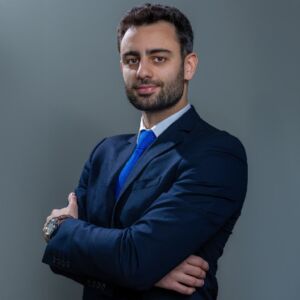 With a background in finance, including experience in financial advisory at Deloitte and currently working in investment banking, with a focus on energy and infrastructure, pursuing this Energy MBA was a strategic career decision. My experience provided a grounding in the financial aspects of the energy sector, but I recognized the need to broaden my understanding of other complex dynamics that shape this industry.
With a background in finance, including experience in financial advisory at Deloitte and currently working in investment banking, with a focus on energy and infrastructure, pursuing this Energy MBA was a strategic career decision. My experience provided a grounding in the financial aspects of the energy sector, but I recognized the need to broaden my understanding of other complex dynamics that shape this industry.
As I near the completion of this degree, I can confidently say the program has broadened my perspective. Investment banking in the energy sector requires a deep understanding of project finance, which is technically complex, as well as the nuances of M&A processes, including grasping the economic drivers behind assets and platforms, tailoring information packages to specific audiences, and managing seller-buyer expectations while navigating a range of financial, technical, and legal considerations. While my professional experience this far has strengthened my financial acumen, this MBA has equipped me with a much more well-rounded skill set. By exploring areas beyond finance, such as corporate strategy, market dynamics, competition, legal frameworks, and technical aspects of energy systems, the program has enhanced my ability to approach challenges from multiple angles. These insights have already contributed to my growth as a professional and will continue to do so in the years ahead.
The energy sector is far from simple; it is shaped by geopolitics, regulatory frameworks, and rapid technological advancements, all of which contribute to its dynamic nature. In Romania, for instance, the legal landscape has evolved over time, with government support schemes being introduced and modified, while on the technological front, globally, innovations are continuously reshaping capital expenditures, requiring constant vigilance as these shifts influence business cases. These are just a few examples of the sector’s complexity, which is interwoven with a multitude of other factors.
This Energy MBA has allowed me to explore the systems, policies, and markets that form the backbone of the energy sector. The opportunity to engage with legal frameworks and collaborate with legal professionals was immensely valuable. Additionally, interacting with technical experts has been crucial, especially since, as a finance professional active in the energy field, it would be a missed opportunity not to understand the inner workings of technical systems, such as those in a solar park.
Overall, as can clearly be inferred by the aforementioned, one of the most rewarding aspects of the MBA has been working alongside professionals from a wide range of energy sub-sectors: portfolio managers, developers, engineers, architects, and policy experts. This diversity has enriched my understanding of the industry.
Equally important was the program’s emphasis on practical application. Every class bridged theory with real-world challenges, often through case studies. These included evaluating strategic missteps across the energy value chain, analyzing managerial decisions and their outcomes, and assessing competitive dynamics – identifying both fair and unfair practices. This hands-on approach fostered critical thinking, equipping one to tackle complex challenges of the energy industry moving forward.
One class that particularly stood out to me was the Energy Trading module, taught by Professor Corina Popescu (former CEO of both Transelectrica and Electrica, with a distinguished career across multiple key positions) alongside Visiting Professor Rudiger Kiesel (who is also a researcher at the Grantham Research Institute on Climate Change and the Environment at the London School of Economics). This course played a pivotal role in shaping my thesis, where I developed a model to forecast electricity prices using artificial intelligence, integrating it into a coded battery energy storage system (BESS) trading model. The model I created is designed to optimize revenue by refining charging and discharging strategies based on granular price forecasts. It’s a flexible tool, allowing users to adjust input parameters to suit the specific characteristics of their BESS. From a managerial perspective, the model is particularly valuable for assessing the feasibility of BESS in Romania, assisting in project appraisals by optimizing operations across various electricity markets (DAM, IDM, and balancing). By adopting a forward-looking approach, it aims to maximize revenue generation potential. I chose this topic for my thesis because it blends technical work with real-world application. Energy storage systems are highly relevant to the current dynamics of Romania’s electricity market, and substantial deployment of these systems is anticipated in the coming years.
As a finance professional, I can confidently say that the Financial Management class, taught by Professor Mihai Darie (currently the Country Manager of Helleniq Renewables), was exceptionally insightful. It offered a thorough introduction to project-based financial mechanisms, serving as both a valuable refresher for financial professionals and a great learning opportunity for those without a finance background. The course was highly practical, helping us grasp key financial concepts while working through financial models.
Reflecting on the journey, I can say that the Energy MBA has been a transformative experience. What I anticipated as a way to “round out” my skill set in the energy space has turned out to be a very enriching experience. I have not only gained in-depth knowledge in energy markets, strategy, regulations, and more, but also built lasting relationships with peers and mentors who will continue to influence my career long after the program ends.
The MBA has prepared me to think beyond just the financial aspects of energy – to consider how market trends, technological innovations, legal frameworks, and other aspects intersect and influence one another. It has given me a holistic understanding of the energy sector and has armed me with the tools to make more informed, impactful decisions in my role, and developed skills tailored to those more for managerial positions too as I go upwards in my career.
For anyone considering applying to this program, I would be more than happy to chat and share insights about what to expect. I would’ve written more here, but ultimately, as I am in the process of submitting my thesis, I’d like to take a moment to offer special thanks. First, to Professor Corina Popescu, whom I mentioned earlier, for her invaluable guidance throughout the program and for being so proactive as my thesis supervisor. I also want to express my gratitude to Professor Cristian Busu (former President of ELECTRICA SA and State Secretary in the ministry of energy) for his mentorship and support, both in the classroom and in conversation, and honored by his nomination of me as the representative of the 2025 graduating class in writing this article. A sincere thank you to all the faculty and peers who made this journey so enriching, and also to Professor Catalina Nedelcu, with whom I had the privilege of taking both Business Strategy and Corporate Governance classes, and who also coordinated the entire program. I look forward to staying connected and being an active member of the alumni community.
ABOUT
-
Alexandros Gkogkos, Energy MBA Alumni, Investment Banking Senior Associate – Blu Capital Partners





